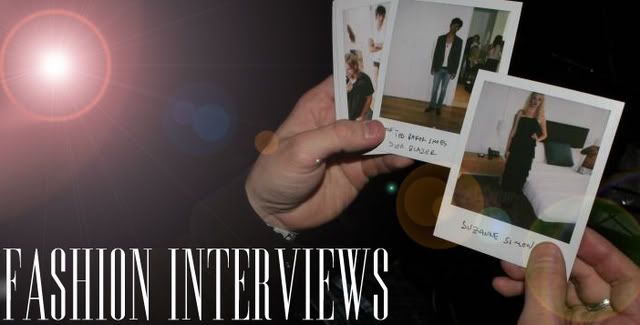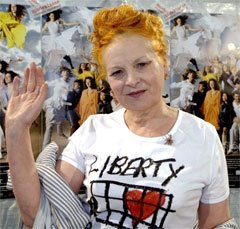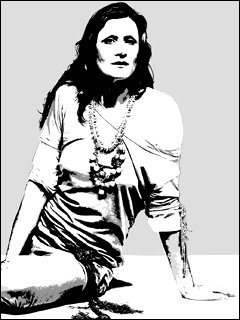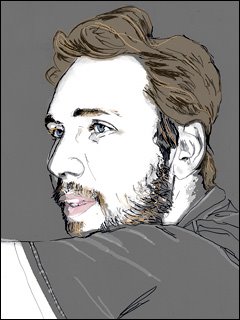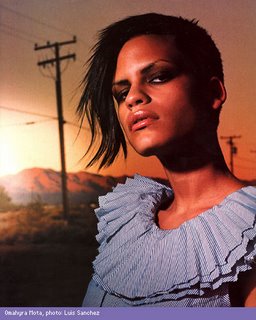Kate Moss (March, 2003)

Penny Martin, Editor,: Kate Moss, we have invited you to participate in our series of interviews with major image-makers because you occupy the roles of both image and image-maker. Not only are you one of the most talked-about and desired women on earth, you rose to fame during a decade where fashion became a mainstream cultural concern. You are the face of a British youth movement shaped by the end of Thatcherism, dance culture and new technology. Does any of that make you happy?
Kate Moss: Yes, it definitely makes me happy that I'm part of a period of such cultural change. However, I don't think about me being a desired woman, or as being talked about, because that would make me paranoid.
Phil Bicker, New York: Before modelling, did you have any idea of what you'd like to do?
Kate Moss: I knew I wanted to travel, because my Dad worked in the travel business and I knew I wanted to leave Croydon. I hadn't even thought about what I wanted to do when I left school because I was only 14 when I started modelling.
Charlotte Cotton, Victoria & Albert Museum, London: What did it feel like to see yourself on the cover of The Face in July 1990?
Kate Moss: I was really embarrassed because there were pictures of me topless inside. I was still at school of course, so I got a lot of stick because I was so flat-chested.
Elaine, New York: How much of your success would you attribute to your management? At what stage did you start to make your own decisions rather than following instructions?
Kate Moss: Quite early. When I started working a lot, at one point I was doing about 10 flights in a week and I had to start saying no to things. Of course, your management push to get you work and you want them to think about the long-term, where I would be like 'I want to do The Face', even thought it wouldn't earn me any money.
Charlotte Wheeler,: At what point did you realise that your height wasn't going to stand in the way of your success?
Kate Moss: When I started doing shows, because of course, everyone else was taller. I thought, 'if I can do the runway with all these taller girls, then nothing can stand in my way'.
Marianne Faithful, Paris: So Kate - I went through a long period of time where I thought it would never all work out. Wanting the dream to come true, then it changed and the dream became a reality. Have you ever experienced that? Please explain.
Kate Moss: Oh, God, Marianne! I didn't really have a dream where I thought 'Oh, I want to be a star'. It kind of all rolled along and then suddenly, I was in the papers and it was all a bit of a shock. Now I've got the dream because I've got the family and I'm still working. That was my dream always.
Sadie Frost, London: What's been the happiest day of your life?
Kate Moss: Well, you know, I gave birth, so that's definitely got to be up there!
Euan Angus, Galloway: What's your all-time favourite cover featuring yourself?
Kate Moss: Probably now, it's the Face one or the June 1998 Vogue one with the sheepskin.
John Galliano, Paris: My first show in Paris was also your first defile for me in Paris. If I remember you were only 16 years old...How did you feel doing the show with the top supermodels Naomi, Linda and Christy?
Kate Moss: I was so nervous that I couldn't eat all day. The runway was the longest one I've ever seen. I felt like it went on forever and I was up there on my own. The afterwards, we went to watch the video at his office and someone had stolen all the champagne. There was only whisky and I drank so much that I passed out at his dinner. I was supposed to be back at school on Monday morning and I was still in Paris on Wednesday!
Nick Knight, Richmond: Why do you model? Is it a need for love and appraisal? Is it a natural desire to show off? Is it art or is it a drug?
Kate Moss: I wasn't a show-off by nature, but I do think you get into that, even though I was shy. That becomes the drug.
Jonathan The, Perth, Western Australia/Achim Reichert, Paris: On a photo shoot do you feel like an artist or a mobile sculpture? What is the level of your involvement?
Kate Moss: I felt like I have to become what the team want me to become. It grows: the make-up and the hair, and then the light... The atosphere of the shoot: you become that. Being versatile is what makes a good model.
Harold Koda, Costume Institute, Metropolitan Museum, New York: If clothing can be art, has there been one piece of apparel that you have worn which was a transcendent masterwork?
Kate Moss: I have worn things by John Galliano (it was a gypsy skirt with purple tulle with bells all over it and a fox jacket that was unbelievably amazing) in an Annie Leibowitz shoot for American Vogue that were definitely transcendent masterworks.
Joanna Leonard, Teddington: Do you ever look at any of your old campaigns and think: 'that doesn't look anything like me'?
Kate Moss: Yes, all the time.
Penny Martin, Editor, : Is there an image of you that you wish you'd never had taken?
Kate Moss: I'm sure there are, but I can't think of *one* right now.
Ka-Poon Chan, Hong Kong/Luke Rynderman, Sydney/Miche,, France: Which photographer do you most like working with and why?
Kate Moss: They are all different. You get something different out of working with different people, so I wouldn't want to work with one alone.
GrZ�goire Alexandre, Paris/Juani Sarrabayrouse, Buenos Aires: David Bailey said he falls in love with everyone he photographs. Can you describe the model/photographer dynamic? Do you ever feel uncomfortable being photographed?
Kate Moss: When I work with a photographer, I try to become what they feel. It's not even like you're smiling, it's an instinct. If you can get where they are coming from, then that's the dynamic. I feel uncomfortable being photographed by paparazzi and there is only one instance where I've felt uncomfortable with one guy. He got put in prison because he was a perv.
Geert De Keyser, Belgium: What qualities make a photographer brilliant?
Kate Moss: Light and retouching! Ha!
Mario Testino, London: Am I still your number one as you're certainly still mine?
Kate Moss: Of course, Mario, you'll always be my number one.
Solomon Light, Adelaide/Adam Levett, Toronto: Why do you like shooting with Mario Testino?
Kate Moss: Because we just have the BEST time. We have so much fun!
Daniel Brown, SHOWstudio: Do you let photographers know what you think of their images? Do you bluntly tell them if you don't like an image, or do you have more subtle ways to hint that you're not impressed?
Kate Moss: I say 'I prefer that one'. I don't actually say if I don't like it.
Wong Kar Wai, Hong Kong: What's it like working with Nick Knight?
Kate Moss: It's an experience. It's intense. Always. And you're really working, you can't get off lightly. You can't sail through the day.
Glen Luchford, London: Is Glen Luchford the best photographer you have ever worked with?
Kate Moss: Sorry, Glen! Mario asked first!
Marc, Paris: Would you mind working with a lesser-known photographer?
Kate Moss: No, I woudn't mind at all!
Mert and Marcus, London: Who is your favourite: Mert or Marcus?
Kate Moss: I can't say - they're just both divine! I couldn't pick. I love those boys, they're fantastic.
Marc, Paris: Are there any surprises left in fashion photography for you?
Kate Moss: You can definitely always push it a bit more.
Luke Hahn, Melbourne/Agnes, Hong Kong/OK, Hong Kong/G.Rt De Keyser, Belgium: Define beauty.
Kate Moss: I can only think of Lila. My daughter is the most beautiful thing to me.
Pablo Gimenez Zapiola, Texas: What do you think it is about your appearance exactly that has brought you fame?
Kate Moss: I've no idea. At all.
Juergen Teller, London: Are your nipples really like fighter pilots thumbs?
Kate Moss: My assistant, Fi Fi, says you could hang two wet duffle coats of them with two bottles of Irn-Bru in the pockets.
Peter Lindberg, New York: When you look in the mirror, do you think you see what other people see?
Kate Moss: No, probably not.
Penny Martin, Editor, : At what stage did it become evident after the publication of the Corinne Day story in the May 1993 issue of British Vogue that you were destined to become the leitmotif in every tabloid discussion of body size? How did you decide to deal with it?
Kate Moss: I just thought it was all bollocks, basically. It was upsetting sometimes, but I was really young and skinny and some girls just are. That was me, I wasn't trying to be anyone else.
Landon Bradley, Vancouver: Why do you think the media chose to pin the debate about body image on you when there are so many other small female celebrities?
Kate Moss: It was just the time. It was a swing from more buxom girls like Cindy Crawford and people were shocked to see what they called a 'waif'. What can you say? How many times can you say 'I'm not anorexic'?
Harvey Allen, Stroud: Have you ever been on a diet?
Kate Moss: After having Lila, I couldn't have my french toast in my fry-up in the morning. I had to watch what I was eating, after having been eating for two!
Deanne Jade, The National Centre for Eating Disorders, London: I visit schools on a regular basis, talking to students about their weight issues. If you were asked by a student, 'what would I have to do to look like a model?' what would be your honest answer?
Kate Moss: You have to be yourself, as models come in all sorts of shapes and sizes. There are girls who are out there who are more voluptuous and they work better for different sorts of stories.
J. J., Washington D.C.: Last year I lost 55 pounds and started modelling, but have since gained 30 back. Things have fallen apart and I have lost the motivation to diet. I am desperate. How do you do it?
Kate Moss: I wouldn't advise anyone to be desperate to model. Certainly not by dieting so intensively.
Dafne, Milan: When is thin too thin?
Kate Moss: When you look ill. When you're not healthy.
Bryony, London: Are you a feminist?
Kate Moss: I'm an independent woman, yes.
Igor Mijalkovic, Yugoslavia/Ceri, London: What's the meaning of the heart tattoo on your hand?
Kate Moss: It's personal. It was when I was young and in love.
Zoe, Maidstone/Didi, Italy: Who advises you on your hair? Will you cut it short again?
Kate Moss: No, never again. I had to do it because I'd talked about it for years, but now I'm growing it long again.
Naomi Campbell, Location Unknown: Did you ever feel that I was over-protective? Did I ever nag you?
Kate Moss: You took me under your wing, but ocasionally, yes! You did!
Allan Martin, London/Alexandre de Bellefeuille, Montreal: You must have experienced just about everything in your career in fashion. How has your perception of the industry changed?
Kate Moss: I don't think it has, really. I don't really do the shows: that's really when you ssee the industry in its full glory. I work with people more on a one-to-one basis, and therefore see it less as an industry.
David Fahey, Greenwich Village: What's the most hurtful thing anyone in fashion has ever said to you?
Kate Moss: There's been quite a lot! Fashion people can be very bitchy, especially when you're young. People said 'if you don't take you're clothes off, I won't use you'. When you're young, you're put under a lot of pressure.
Oscar Arzamendi, Mexico City: Does your role in promoting companies that drive global capitalism worry you?
Kate Moss: I've got a lot to deal with, never mind taking on global capitalism.
Pao, Italy: Who are the 5 most powerful people in fashion industry?
Kate Moss: Anna Wintour, Mario Testino, Bernard Arnault, Tom Ford and in his day, Steven Miesel could make or break a girl
Nicolas Coleridge, Chairman of British Fashion Council, London/Emma, London: If you could only wear three designers for the rest of your life, which would they be?
Kate Moss: John Galliano Alexander McQueen Stella McCartney
Dylan Jones, Editor, GQ, London: What would you wear if we photographed you for the cover of GQ?
Kate Moss: Probably nothing, knowing GQ!
Tom Tesch, Vienna: You are clearly a woman with a strong sense of style. Would you ever consider becoming a fashion editor?
Kate Moss: I have thought about it. Maybe later. I do love clothes.
Daniel Mayer, Munich/Samantha, USA: How would you advise someone interested in pursuing a career in the fashion industry?
Kate Moss: Try and get into work experience with a designer or a magazine.
Craig McDean, New York: You've had so many lenses pointed at you that I hardly know what you're thinking anymore. What's it all about for you now? Do you know you're gorgeous?
Kate Moss: For me now, it's about going to work and creating something new and having fun.
David Bailey, London: Who are the five most attractive and sexy men and women that you've met?
Kate Moss: Jefferson, Daniel Day Lewis, Frank Sinatra (he was REALLY attractive), Emanuelle, Roman Polanski's, wife Marianne Faithfull
Rob W, Canada: Does fame make it more difficult to find love?
Kate Moss: Yes, definitely.
Edward Enninful, London: Which would you rather ride: a limo, a camel or a man?
Kate Moss: A man, of course! What are you like?
Michelle Duguid, : Corinne Day is on record as saying that after the controversy the 1993 Vogue shoot caused, you cut all ties with her. What was it like working with her again in 2000, after seven years had gone by?
Kate Moss: It was amazing. It was like a day hadn't passed. We had a great time.
Landon Bradley, Vancouver: Are Jake and Dinos Chapman misanthropes?
Kate Moss: No.
Alexander McQueen, London: Do you take it up the arse?
Kate Moss: Lee, you know! I'm not going to tell the whole world! We know you do...
Katy England, London: Is the Pope a Catholic?
Kate Moss: What about you, Katy?
Jenny Vagan, Paris: Does Marianne Faithful give you good advice?
Kate Moss: Yes, she does. We both give each other good advice, I think.
Simon Foxton, London: What do you find attractive about Jefferson?
Kate Moss: He is the sweetest man I've ever met. Definitely.
Ursula Young, Ullapool/kirsty, london: Has he proposed?
Kate Moss: No, he hasn't.
Paul Bastick, Hanover: Who will design your wedding dress?
Kate Moss: I can't imagine myself in a wedding dress. I have worn them on runways. I did Brides magazine when I was 15! But, I haven't thought about it.
Fiona Campbell, London: Just about every restaurant in London claims that you lunch there. Do you really eat in a different place every day?
Kate Moss: Yes, most days! No, I don't really. I work, I can't go to restaurants every day.
Terry Jones, Editor in Chief & Creative Director, i-D, London: Who first called you 'Kitty'?
Kate Moss: Edwina. (Edward Enninful)
Penny Martin, Editor, : Where did you learn to pole dance like you did on the Corinne Day documentary?
Kate Moss: I had lessons at Astral, that strip club. It was amazing exercise, we did it for toning as it was more fun than going to the gym. It is so hardcore: pulling your body up onto a pole.
Frieze Magazine, London: What's your favourite work of art featuring you?
Kate Moss: The Lucien Freud painting!
Jose Duran, Barcelona: What's your favourite porn film?
Kate Moss: I don't know any names!
Julien, Li?ge: Who's your favourite writer?
Kate Moss: F. Scott Fitzgerald.
Mario Sorrenti, New York: What is your favourite colour of knickers?
Kate Moss: Pink. I know what kind of knickers you like!
Ana de la Vega, Madrid: What's your favourite magazine?
Kate Moss: Another Magazine.
Meg Matthews, London: What's your favourite cheese?
Kate Moss: Brie, as you know very well, Meg.
Kode, toronto: Do you have a favorite web site ?
Kate Moss: No, I don't.
Rob W, Canada: What are your views on George Bush?
Kate Moss: He's frightening. I can't even look at him.
Kim Sion, Smile Management, London: Have you been down to Argos lately? Which is your favourite branch?
Kate Moss: Last time I went to Argos, it was in Croydon, down Surrey Street Market.
Jenny Vagan, Paris: Do you own a bible? Have you any spiritual convictions?
Kate Moss: Yes, I do own a bible, but I couldn't recite any of it for you.
Val Garland, London: What make-up product could you not live without?
Kate Moss: Black eye-liner. Always.
Corinne Day, London: I would imagine Kate would be such a great Mum... I can't wait to give Lila a cuddle! My question to Kate would be: 'how is day to day life with Lila?'
Kate Moss: She wears her bangles that you gave her every day. You've got to come over soon because she is so gorgeous.
Kate Currans, Philomath: What did you crave during your pregnancy?
Kate Moss: Japanese.
Lois Wang, Taiwan: How did you shrink back to your original size after giving birth so quickly?
Kate Moss: I worked out in Thailand a *bit* and watched what I ate a bit, but I didn't make an intensive effort.
Ian Murray, Manchester: Have you given up smoking?
Kate Moss: No.
Rosie, London/Sofia Kazulkina, USA: Where did the name Lila Grace for your baby daughter come from?
Kate Moss: I had a book and it was called 'Lila Says' and I just loved the name. Grace I really loved.
Pat Byrne, Tallaght: Who are Lila's godparents?
Kate Moss: I haven't decided completely.
Guillaume, Toulouse/Joris Eeckhout, Cork: Will motherhood mean you do less modelling?
Kate Moss: I won't be flying around and doing the shows, but I will still be working.
Eugene Souleiman, London: What is it like to have someone to care for other than yourself?
Kate Moss: It's the best feeling in the world.
Verity McIlveen, Senior Editor, WGSN, London: Hi Kate, Congratulations on the birth of lovely Lila. What's your favourite motto for life right now?
Kate Moss: I don't really have one!
Jelle, Brussels: Has the birth of your baby changed the way you look at other women?
Kate Moss: Yes, when you're a mother it definitely changes the way you feel about life in general.
Nic Mulvaney, London/Anna Parker, Essex/Wong Kar Wai, Hong Kong/ANNA, ESSEX: Would you be happy for your daughter to pursue a career in modelling?
Kate Moss: No, I wouldn't want her to be a model. I don't think it's the best industry really for young girls. Unless you're really strong, it can really fuck you up.
Hilary Semple, Utah: Do you worry about younger models taking your place on the catwalk?
Kate Moss: No. Good luck!
Ada, Bologna: What will you do after modelling?
Kate Moss: I don't know yet.
Phil Bicker, New York: Name three things you'd like to do that you haven't before.
Kate Moss: I'd like to jump out a plane I'd like to scuba dive on the Great Barrier Reef I'd like to sail around the islands in Tahiti with my family
Dylan Pharazyn, Auckland/Kristin, Location Unknown/Marian, Fashion UK, London/Joris Eeckhout, Cork/Dan Whittaker, Hackney/Elaine Cristina, Norway/Gavin, London/Justin Montag, NYC: After your collaborations with Bobby Gillespie and Primal Scream, do you have any ambitions to pursue a career in music? What other musicians would you like to work with?
Kate Moss: No, I only worked with Bobby because I've known him for years and I couldn't turn down the experience of being with him and the band in the studio. I love them.
Fran Cutler, London: What do you think you would you be doing now if you were not spotted in JFK airport by Sarah Doukas?
Kate Moss: Who knows.
Guido, London: How do you cope with being a housewife, a modern day icon and a mother? When you retire, will it be to Croydon?
Kate Moss: I'm coping very well at the moment, thank you! I'm not retiring in the near future and when I do, it definitely will not be to Croydon!
Liberty Ross, London: Which image would you like to be remembered for? Which would you most like to be forgotten?
Kate Moss: I like the Nick Knight cover I mentioned. That was a good moment. I'd like the Vogue pictures that they harped on about anorexia over to be forgotten.
Geth, Location Unknown/Landon Bradley, Vancouver/Richard, London/Robert W, Canada/Michael Chichi, San Francisco/Luke Rynderman, Sydney/Pao, Italy/Andrew Warwick, Derbyshire/Bjorn Larsen, Brooklyn: The above list of people all chatted you up / asked you for a date in various, often unrepeatable ways. Would you like to accept any of them?
Kate Moss: No. I'm happy with Jefferson right now!
Penny Martin: Question: Thank you for being so candid Kate, It's been a pleasure interviewing you. Where are you off to now?
Kate Moss: Going for dinner!
